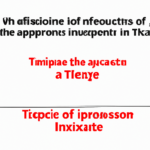Taxation has a significant impact on income distribution within a society. Progressive tax systems, where the tax burden increases as income rises, aim to reduce income inequality. By redistributing wealth from higher-income individuals to those with lower incomes, progressive taxes help bridge the wealth gap. However, the effectiveness of taxation in reducing income inequality depends on various factors such as tax rates, deductions, and loopholes. Flat tax systems, on the other hand, can exacerbate income inequality as they place the same tax rate on all income levels. It is crucial to design taxation policies that strike a balance between promoting economic growth and addressing income disparities to ensure a fair and equitable society.
Table of Contents
(Taxes on Producers- Micro Topic 2.8)
Taxation plays a crucial role in shaping the distribution of income within a society. The way taxes are levied and collected can have a significant impact on how wealth is shared among individuals and different socioeconomic groups.
One major impact of taxation on income distribution is through progressive taxation. Progressive taxation is a system where individuals with higher incomes are taxed at higher rates than those with lower incomes. This helps to redistribute wealth from the rich to the poor, narrowing the income gap.
Additionally, taxation can be used to fund social welfare programs such as healthcare, education, and social security. These programs help to provide equal opportunities and support for individuals from lower-income backgrounds, contributing to a more equitable distribution of income.
On the other hand, taxation policies can also have unintended consequences on income distribution. For example, if taxes are too high, they can discourage investment and entrepreneurship, which can hamper economic growth and job creation. This can ultimately lead to a more unequal distribution of income.
Moreover, tax evasion and tax avoidance can undermine the impact of taxation on income distribution. When individuals and corporations find ways to avoid paying their fair share of taxes, it places a heavier burden on those who are unable to exploit such loopholes, exacerbating income inequality.
To sum up, taxation has a profound influence on income distribution. Progressive taxation and funding social welfare programs can help promote income equality. However, careful consideration is necessary to strike a balance between taxation, economic growth, and addressing the root causes of inequality.
Income inequality
Income inequality is a pressing issue that has a significant impact on society. It refers to the unequal distribution of wealth among individuals or groups within a given population. This disparity in income can have far-reaching consequences for individuals, families, and the overall economy.
One of the key factors contributing to income inequality is the impact of taxation on income distribution. Tax policies play a crucial role in shaping the distribution of wealth in a society. The way income is taxed can either exacerbate or alleviate income inequality.
Progressive taxation is often seen as a way to address income inequality. This type of taxation system imposes higher tax rates on individuals with higher incomes, while lower-income individuals pay lower tax rates. This approach is based on the belief that those who earn more have a greater ability to pay taxes and should contribute more to society. By redistributing resources from the affluent to the less fortunate, progressive taxation aims to reduce income inequality.
On the other hand, regressive taxation can widen the wealth gap. This type of taxation system imposes higher tax rates on lower-income earners, while higher-income individuals enjoy lower tax rates. Regressive taxation places a heavier financial burden on those who can least afford it, perpetuating income inequality.
Furthermore, tax loopholes and exemptions can also contribute to income inequality. Wealthy individuals and corporations often take advantage of tax loopholes to reduce their tax liabilities, further widening the income gap. These loopholes allow the affluent to retain a greater share of their wealth, while low-income individuals struggle to make ends meet.
The impact of taxation on income distribution goes beyond the immediate effects on individuals’ financial situations. Income inequality has social and economic implications, including reduced social mobility, increased crime rates, and diminished economic growth. Addressing income inequality through progressive taxation can help create a more equitable society, where everyone has access to opportunities for upward mobility.
In conclusion, income inequality is a significant issue that requires attention. Taxation policies have a profound impact on income distribution and can either exacerbate or alleviate income inequality. By implementing progressive taxation and closing loopholes, society can take steps towards a more just and equitable distribution of wealth, benefiting individuals, families, and the overall economy.
Progressive taxation
Progressive taxation is a system where the tax rate increases as income rises. It is designed to reduce income inequality and ensure that the burden of taxes falls more heavily on those with higher incomes. This type of taxation is based on the principle of ability to pay, meaning that those who earn more can afford to pay more in taxes.
One of the main advantages of progressive taxation is its impact on income distribution. By taxing higher incomes at a higher rate, the government can generate more revenue and use it to fund programs and services that benefit those in lower income brackets. This can help reduce poverty and improve social mobility.
Another benefit of progressive taxation is its ability to address wealth disparities. In many societies, a small percentage of the population holds a disproportionately large share of the wealth. By implementing a progressive tax system, governments can help redistribute wealth and reduce economic inequality.
Critics of progressive taxation argue that it discourages hard work and investment by taxing success at higher rates. However, proponents argue that it promotes fairness and social justice by ensuring that everyone pays their fair share based on their ability to do so.
In practice, progressive taxation can be implemented through a graduated tax rate structure. The tax rates increase progressively as income levels rise. This means that those in higher income brackets pay a larger proportion of their income in taxes.
Countries like Sweden, Denmark, and Norway have successfully implemented progressive tax systems. These countries have high levels of income equality and provide a strong social safety net for their citizens.
Overall, progressive taxation is an effective tool for reducing income inequality and promoting social justice. It ensures that those who earn more contribute a greater share of their income to support society. By implementing progressive tax systems, governments can create a fairer and more inclusive society for all.
Regressive taxation
Regressive taxation is a system where the tax burden falls disproportionately on low-income individuals. Instead of being based on the ability to pay, regressive taxes tend to take a larger percentage of income from those who earn less.
This type of taxation exacerbates income inequality and widens the gap between the rich and the poor. When low-income individuals are forced to hand over larger portions of their income in taxes, it leaves them with less to cover basic living expenses, such as food, housing, and healthcare.
A classic example of regressive taxation is sales tax. Since everyone pays the same percentage regardless of income, it affects those with lower income more severely. For someone who earns minimum wage, a 10% sales tax would take a larger chunk out of their earnings compared to someone earning a higher income.
Another regressive tax is the flat tax, where everyone pays the same tax rate regardless of income. While this may seem fair in theory, it fails to consider the ability to pay. For someone earning a million dollars a year, a 15% flat tax would be a lot less burdensome than for someone barely scraping by on minimum wage.
This regressive tax structure perpetuates a cycle of poverty, as individuals with limited financial resources are constantly struggling to make ends meet. With inadequate income, it becomes increasingly difficult for individuals to improve their socioeconomic status and escape the grip of poverty.
To address regressive taxation, policymakers should consider implementing a progressive tax system, where higher-income individuals are taxed at a higher rate. This would help redistribute wealth and provide sufficient funding for social programs that benefit those in need.
Governments can also explore alternatives like estate taxes and luxury taxes, which target the wealthier segments of society. By ensuring that those who are better off contribute a larger share of their income, a progressive tax system can help reduce income inequality and support a more equitable society.
In conclusion, regressive taxation places a heavier burden on low-income individuals, exacerbating income inequality and perpetuating cycles of poverty. To achieve a fairer and more balanced income distribution, policymakers should consider implementing progressive tax systems that take into account the ability to pay. By shifting the tax burden towards higher-income individuals, we can support social programs and strive for a more inclusive society.
(Different Tax Systems' Effects on Income Distribution (part 1))
Tax incidence
Tax incidence refers to the way in which a tax burden is distributed among different groups in society. It is an important concept to understand when analyzing the impact of taxation on income distribution.
When a tax is imposed on a particular good or service, it can have different effects on both producers and consumers. The burden of the tax can be shifted to either party, depending on the elasticity of demand and supply.
In the case of an inelastic demand, where consumers are not very responsive to changes in price, the burden of the tax is likely to fall more on consumers. This is because producers can increase the price without losing too many customers. On the other hand, if the demand is elastic, consumers are more sensitive to changes in price, and producers will bear a larger share of the tax burden to prevent losing customers.
Similarly, the burden of a tax can also be shifted to producers if the supply is inelastic. In this case, producers are not able to easily adjust their production levels to avoid the tax and will pass on the burden to consumers by increasing prices. On the contrary, if the supply is elastic, producers can adjust their production levels more easily, and consumers will bear a greater portion of the tax burden through higher prices.
Tax incidence is not limited to just producers and consumers. It can also affect factors of production, such as labor and capital. When taxes are imposed on businesses, they may reduce their investment in new capital or decrease the wages they pay to workers. This can lead to lower income levels for employees and a decrease in economic growth.
The distributional impact of taxation on income can also be seen through the lens of progressivity. Progressive taxation refers to a system where higher-income individuals are taxed at higher rates, while regressive taxation means that lower-income individuals bear a larger burden.
In conclusion, understanding tax incidence is crucial when analyzing the impact of taxation on income distribution. It helps us determine who bears the burden of taxes and how they affect different groups in society. By considering factors such as price elasticity, the distribution of tax burden, and progressivity, policymakers can design tax policies that promote fairness and equality in income distribution.
Tax loopholes
Tax loopholes play a significant role in shaping the distribution of income. These legal provisions and strategies allow individuals and corporations to minimize their tax liabilities, often benefiting the wealthy at the expense of the less affluent. The impact of these loopholes on income distribution is profound and deserves careful examination.
One commonly exploited tax loophole is the use of offshore tax havens. Wealthy individuals and multinational companies can create offshore accounts or establish shell companies in low-tax jurisdictions to shift their profits and avoid paying higher taxes in their home countries. By doing so, they can significantly reduce their overall tax burden, while the less affluent bear a heavier load.
Another common tax loophole is the favorable treatment of capital gains. In many countries, capital gains are taxed at a lower rate than other forms of income. This disproportionately benefits the wealthy, who are more likely to derive a significant portion of their income from investments. Meanwhile, lower-income individuals who depend primarily on wages face higher tax rates on their ordinary income.
Tax loopholes also enable corporations to engage in profit shifting, a practice where they manipulate their accounting to allocate profits to low-tax jurisdictions and expenses to high-tax countries. By taking advantage of these loopholes, corporations can reduce their tax bills, leaving less tax revenue available for government programs that benefit the broader population.
Furthermore, the use of tax havens and other loopholes exacerbates income inequality. As the wealthy utilize these strategies to minimize their tax obligations, the burden of funding public services and social welfare programs falls disproportionately on the less affluent. This further widens the gap between the rich and the poor, hindering efforts to achieve a more equitable distribution of income.
To address the impact of tax loopholes on income distribution, governments should prioritize closing these gaps in the tax system. Reforms could include tightening regulations on offshore tax shelters, increasing transparency in corporate accounting practices, and implementing progressive tax policies that reduce the benefits of exploiting loopholes.
By closing tax loopholes, governments can ensure that the burden of taxation is distributed more fairly, promote social stability, and create a more equitable society. Additionally, increased tax revenue can provide funding for important public investments, such as education, infrastructure, and healthcare, which in turn can help reduce income inequality and improve overall societal well-being. Ultimately, addressing tax loopholes is a crucial step towards creating a more just and equitable income distribution.
External Links
- Equity and Fiscal Policy: The Income Distribution Effects of Taxation …
- The Impact of Tax and Expenditure Policies on Income Disttribution …
- The Distributional Impact of Taxes and Transfers: Evidence from …
- How do taxes affect income inequality? | Tax Policy Center
- Tackling income inequality – the role of taxes and transfers













